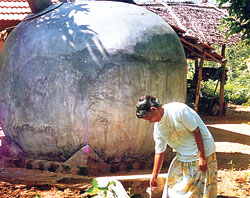Despite heavy rains in certain months of the year, water shortages occur in many parts of the country.
The main reason for water shortages is that a large percentage of the rain that falls on land ends up in the sea. We should therefore collect rainwater to address the problem of water shortages. Doing so would bring down water bill costs and save on the energy required to treat and transport water.
 |
| A household with rainwater harvesting |
The volume of rain that falls on a 1,000-square-metre area in Anuradhapura in one year, for example, would be about 1 million litres or approximately 200,000 gallons. This water can be used for drinking and other purposes.
The importance of harvesting rainwater was highlighted in the article “Rainwater storage for new buildings” (The Sunday Times, March 22). The Water Supply and Drainage Board has recommended making rainwater collection compulsory at all future residential and commercial buildings.
According to the newspaper article, rainwater can be used for a number of purposes, but not for drinking. This is incorrect. Stored properly, rainwater can be kept for several months. In many parts of Sri Lanka, the rainwater collected in tanks is used for drinking.
|

